A collaborative enterprise of academic and pharmaceutical experts in New York City and New Jersey have formed a regional drug accelerator to address the urgent need to develop treatments for SARS-CoV-2, its variants and other pandemic viruses.
The Metropolitan AntiViral Drug Accelerator, or MAVDA, will be funded by a three-year, $65 million grant from the National Institutes of Health (NIH) and the National Institute of Allergy and Infectious Disease (NIAID)’s Antiviral Drug Discovery (AViDD) Centers for Pathogens of Pandemic Concern program.
MAVDA combines world-class virologists and academic drug finders from Rockefeller University, Columbia University and Memorial Sloan-Kettering Cancer Center (MSK) in New York City, and the Hackensack Meridian Center for Discovery and Innovation (CDI) and Rutgers University in New Jersey, along with proven antiviral drug developers Merck, Tri-Institutional Therapeutics Discovery Institute (Tri-I TDI), and Aligos Therapeutics.
MAVDA’s mission will be to discover, optimize and test innovative small molecule antiviral drugs to target coronaviruses (CoVs), emphasizing SARS-CoV-2 which causes the COVID-19 illness, and one or more select RNA viruses with pandemic potential. The goal is to rapidly develop drugs which can be given orally in an outpatient setting in the future.
The program is co-led by drug discovery expert David Perlin at the Hackensack Meridian CDI and Rockefeller University virologist and Nobel laureate Charles Rice.
The program benefits from other senior world class virologists including David Ho (Columbia) and Stephen Goff (Columbia); drug discovery experts Jingyue Ju (Columbia) and Tom Tuschl (Rockefeller); structural biologists Lawrence Shapiro (Columbia) and Dinshaw Patel (MSK); medicinal chemistry, pharmacology and drug-screening experts James Balkovec (CDI), Joel Freundlich (Rutgers), Veronique Dartois (CDI), and Fraser Glickman (Rockefeller).
Key to the initiative’s success is the participation of commercial partners Merck and Co.; the nonprofit Tri-Institutional Therapeutics Discovery Institute through its industrial partnership with Takeda; and Aligos Therapeutics, based in California. All have committed extensive internal resources to support the drug development goals of MAVDA.
“This public-private partnership is how science can prepare for the next phase of SARS-CoV-2, as well as other current and new viral threats,” said David Perlin, Ph.D., the chief scientific officer and senior vice president of the CDI, who is also a professor at the Hackensack Meridian School of Medicine.
“Vaccines were a terrific breakthrough to help stem COVID-19 after the initial spread, but as we have learned with COVID-19 and other pandemic diseases, vaccines alone are insufficient," Perlin said. “We need effective drugs that can be used early and distributed widely to diverse populations around the world.”
“We need to think differently,” said Charles M. Rice, Ph.D., head of the Laboratory of Virology and Infectious Disease at Rockefeller University, who is also the recipient of the 2020 Nobel Prize in Physiology or Medicine. “Bringing all this experience and expertise into the same program and having everyone ‘pull’ in the same direction, can produce some great results.”
The MAVDA consortium brings together scientists who already collaborate on many anti-infective projects, chief among them the CDI's NIH Center of Excellence in Translational Research (CETR), helmed by Perlin and which includes industry participation.
Merck has been among the world leaders in developing antiviral drugs and received FDA Emergency Use Authorization for the outpatient drug molnupiravir.
Merck Research Laboratories Infectious Diseases and Vaccines Vice President Daria Hazuda, Ph.D., said: “Collaborations such as these are critical to develop much needed antiviral options. We are delighted to be participating in this important endeavor.”
This partnership, which coalesced during the federal agencies’ call for plans to discover new anti-viral therapies last year, seeks specifically to leverage the strength of the partners on coronavirus and flavivirus targets.
The scientists have a specific set of eight molecular features in the SARS-CoV-2 virus which have critical roles in viral replication, maturation, and also immune-system evasion. Chief among them is 3CLpro, which is the virus’s main protease for replication.
The teams have put together a “drug accelerator” plan involving five cooperative projects focusing on the targets, and matching likely drug candidates against them. Six integrated pharma-style “cores” of MAVDA provide the expertise from the various institutions.
For example, Rice and Rockefeller’s virology contributions will be complemented by the expertise of Columbia’s David D. Ho, M.D., professor of microbiology & immunology and director of the Aaron Diamond AIDS Research Center. In other areas, Columbia and Memorial Sloan Kettering will provide structural biology prowess, while CDI and Rutgers will contribute medicinal chemistry know-how.
CDI’s capabilities in pharmacology and animal research models will also play a major part in the drug accelerator program, which patterns itself on the TB Drug Accelerator program, of which CDI members have played a major part over the last decade.
“Having these teams, which contribute in their own ways, is going to move the work along faster and more efficiently,” said Ho, of Columbia. “We’re eager to do our part.”
Equally important to these early phases of discovery are the pharmaceutical partners. As Perlin and others have described, the public-private partnership will bridge gaps which normally stifle advancements in key health areas. For instance, CDI and Merck partnered starting in 2020 to conduct drug discovery via the Perlin-led CETR funded by the NIH.
“Tri-I TDI’s mission is to accelerate transformational drug discovery programs – this challenge certainly is of global importance,” said Peter T. Meinke, Ph.D., of Tri-I TDI.
“We are excited to join with the distinguished MAVDA consortium to advance the development of much needed oral antiviral drugs for the treatment of COVID-19,” said Julian Symons, Ph.D., chief scientific officer of Aligos Therapeutics. “Our broadly acting, potent, SARS-CoV-2 3CLpro inhibitor offers the potential to effectively inhibit both current and future variants that may emerge.”
The goal is to take what the scientists discover on the academic side, and rapidly translate it using the capabilities of the pharmaceutical companies.
“We are excited at the breadth of this project, and the huge difference it could make,” said Perlin. “For a global health challenge like COVID-19, we need to think bigger - and differently. We embrace the challenge.”
ABOUT MAVDA
The Metropolitan AntiViral Drug Accelerator, or MAVDA, has a mission to discover, optimize and test innovative small molecule antiviral drugs to target coronaviruses (CoVs), emphasizing SARS-CoV-2, and one or more select RNA viruses with pandemic potential. The goal is to rapidly develop drugs which can be given orally in an outpatient setting. The group is funded by a five-year, $108.5 million grant from the National Institutes of Health (NIH) and the National Institute of Allergy and Infectious Disease (NIAID)’s Antiviral Drug Discovery (AViDD) Centers for Pathogens of Pandemic Concern program. MAVDA combines world-class virologists and academic drug experts from the Hackensack Meridian Center for Discovery and Innovation (CDI), Rockefeller University, Columbia University, Memorial Sloan-Kettering Cancer Center (MSKCC), Rutgers University, along with proven antiviral drug developers Merck, the nonprofit Tri-Institutional Therapeutics Discovery Institute (Tri-I TDI), and Aligos.
ABOUT THE CENTER FOR DISCOVERY AND INNOVATION
The Center for Discovery and Innovation, a member of Hackensack Meridian Health, translates current innovations in science to improve clinical outcomes for patients. More than 21 laboratories, 155 professional researchers and physician-scientists at the CDI have set their sights on cancer, infectious diseases, autoimmune disorders, and other acute and chronic diseases. Clinical need drives the scientific insights, and their application, for these researchers, as shown in the real-time response to the COVID-19 pandemic, resulting in new diagnostics, therapies, and surveillance abilities. The CDI leverages a new wave of scientific advances involving genetics, cell engineering of the human immune system, and imaging to better diagnose, treat and prevent disease through personalized medicine approaches. For additional information, please visit www.hmh-cdi.org.
ABOUT THE ROCKEFELLER UNIVERSITY
The Rockefeller University is one of the world’s leading biomedical research universities and is dedicated to conducting innovative, high-quality research to improve the understanding of life for the benefit of humanity. The university’s unique approach to science has led to some of the world’s most revolutionary and transformative contributions to biology and medicine. During Rockefeller’s 121-year history, our scientists have won 26 Nobel Prizes, 25 Albert Lasker Medical Research Awards, and 20 National Medals of Science.




